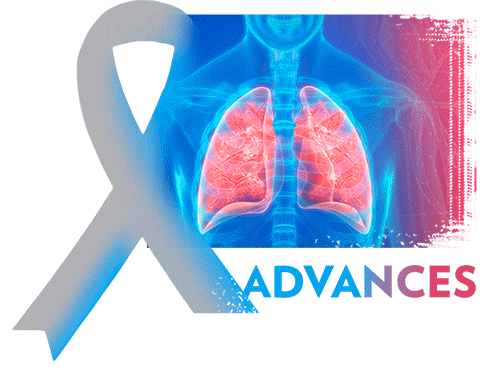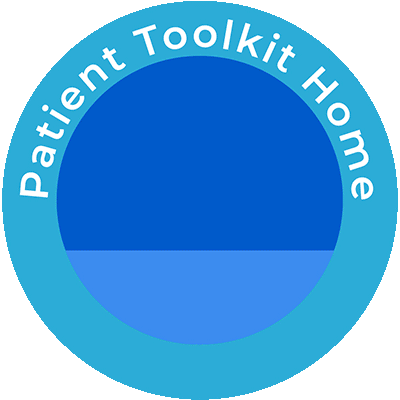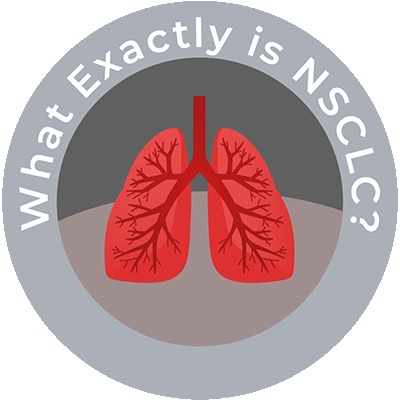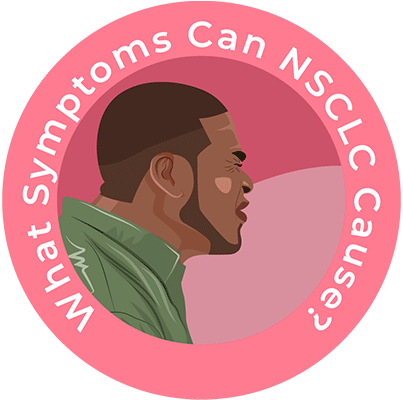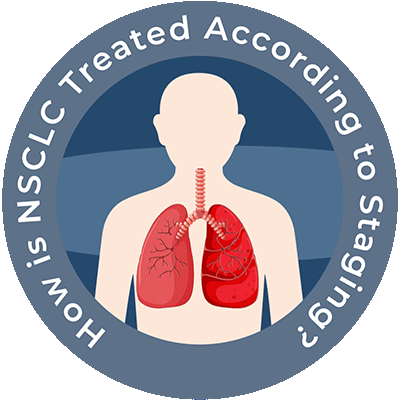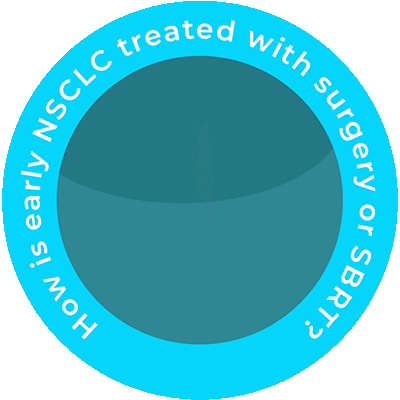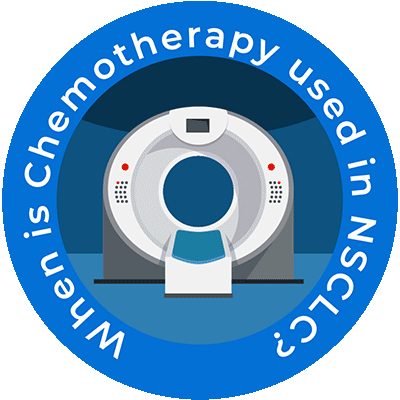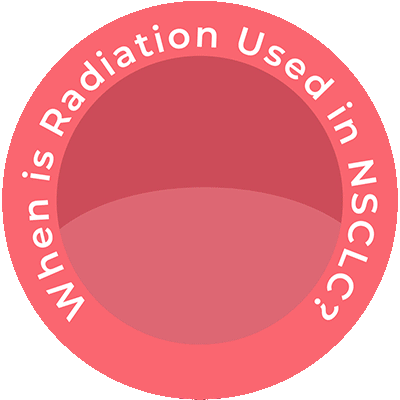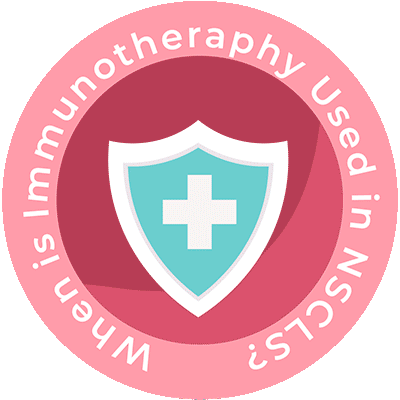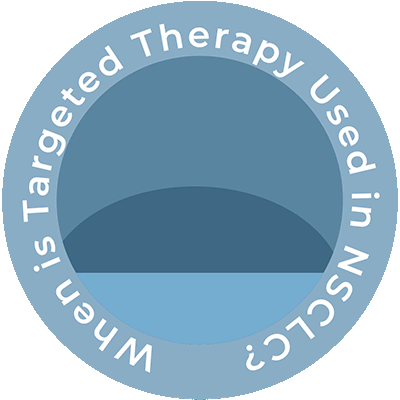When is targeted therapy used in NSCLC?
Targeted therapy
As researchers have learned more about the changes in non-small cell lung cancer (NSCLC) cells that help them grow, they have developed drugs to specifically target these changes. Targeted drugs work differently from standard chemotherapy (chemo) drugs. They sometimes work when chemo drugs don’t, and they often have different side effects. At this time, targeted drugs are most often used for advanced lung cancers, either along with chemo or by themselves.
Drugs that target tumor blood vessel growth (angiogenesis)
For tumors to grow, they need to form new blood vessels to keep them nourished. This process is called angiogenesis. There are two drugs that target tumor blood vessel growth (angiogenesis) known as angiogenesis inhibitors, which block this new blood vessel growth. These drugs are used to treat advanced NSCLC.
- Bevacizumab (Avastin®) is a monoclonal antibody (a lab-made version of a specific immune system protein) that targets vascular endothelial growth factor (VEGF), a protein that helps new blood vessels to form. This drug is often used with chemo for a time. Then if the cancer responds, the chemo may be stopped and bevacizumab is given by itself until the cancer starts growing again.
- Ramucirumab (Cyramza®) is a monoclonal antibody that targets a VEGF receptor (protein). It helps stop the formation of new blood vessels. This drug is often combined with chemo, typically after another treatment stops working.
Either of these drugs might also be used along with the targeted drug erlotinib as the first treatment in people whose cancer cells have certain EGFR gene mutations. Because of the risks of bleeding, these drugs typically aren’t used in people who are coughing up blood or who are taking drugs called blood thinners. The risk of serious bleeding in the lungs is higher in patients with the squamous cell type of NSCLC, which is why current guidelines do not recommend using bevacizumab in people with this type of lung cancer.
Drugs that target cells with KRAS gene changes
About one in four NSCLCs have changes in the KRAS gene that cause them to make an abnormal form of the KRAS protein. This abnormal protein helps the cells grow and spread.
About one in eight people (13%) with NSCLC have a specific type of KRAS gene change (mutation) called KRAS G12C. NSCLCs with this mutation are often resistant to other targeted drugs such as EGFR inhibitors.
Sotorasib (Lumakras®) is a type of drug known as a KRAS inhibitor. It works by attaching to the KRAS G12C protein, which keeps the cancer cell from growing. If your blood or cancer tissue is tested and found to have the KRAS G12C mutation, this drug can be used to treat advanced NSCLC after at least one other type of treatment has been tried.
Drugs that target cells with EGFR gene changes
About one in four NSCLCs have changes in the KRAS gene that cause them to make an abnormal form of the KRAS protein. This abnormal protein helps the cells grow and spread.
About one in eight people (13%) with NSCLC have a specific type of KRAS gene change (mutation) called KRAS G12C. NSCLCs with this mutation are often resistant to other targeted drugs such as EGFR inhibitors.
Sotorasib (Lumakras®) is a type of drug known as a KRAS inhibitor. It works by attaching to the KRAS G12C protein, which keeps the cancer cell from growing. If your blood or cancer tissue is tested and found to have the KRAS G12C mutation, this drug can be used to treat advanced NSCLC after at least one other type of treatment has been tried.
- Erlotinib (Tarceva®)
- Afatinib (Gilotrif®)
- Gefitinib (Iressa®)
- Dacomitinib (Vizimpro®)
- Osimertinib (Tagrisso®) can also be used as an adjuvant (additional) treatment after surgery for some earlier stage lung cancers with certain EGFR gene mutations.
EGFR inhibitors that target cells with the T790M mutation
EGFR inhibitors can often shrink tumors for several months or more. But eventually these drugs stop working for most people, usually because the cancer cells develop another mutation in the EGFR gene. One such mutation is known as T790M.
Osimertinib (Tagrisso®) is an EGFR inhibitor that often works against cells with the T790M mutation.
Doctors now commonly get another biopsy when other EGFR inhibitors have stopped working to see if the patient’s tumor has developed the T790M mutation. In these cases, this drug might be helpful.
EGFR inhibitors that target cells with an exon 20 mutation
While the EGFR inhibitors listed above can help many people whose cancer cells have EGFR gene mutations, they don’t help everyone. For example, cancer cells with an EGFR gene change known as an exon 20 insertion mutation are much less likely to be affected by these drugs.
There are two drugs that target cancer cells with an exon 20 mutation and can be used to treat advanced NSCLC when the cancer cells have an exon 20 mutation, typically after chemotherapy has failed.
- Amivantamab (Rybrevant®) is a monoclonal antibody (a lab-made version of a specific immune system protein) that targets two proteins that help cancer cells grow: EGFR and MET. Because it binds to two proteins, it’s called a bispecific antibody. This drug is given as an infusion into a vein (IV).
- Mobocertinib (Exkivity®) is an oral medication drug that targets the EGFR protein in a slightly different way.
EGFR inhibitors used for squamous cell NSCLC
Necitumumab (Portrazza™) is a monoclonal antibody (a lab-made version of an immune system protein) that targets EGFR. It can be used with chemotherapy as the first treatment in people with advanced squamous cell NSCLC. This drug is given as an infusion into a vein (IV).
Drugs that target cells with ALK gene changes
About 5% of NSCLCs have a rearrangement in a gene called ALK—or anaplastic lymphoma kinase. This change is often seen in people who don’t smoke (or people who are light smokers) who are younger and who have the adenocarcinoma subtype of NSCLC. The ALK gene rearrangement produces an abnormal ALK protein that causes the cells to grow and spread. There are five oral drugs that target the abnormal ALK protein and can often shrink tumors in people whose advanced lung cancers have an ALK gene change. Although they can help after chemo has stopped working, they are often used instead of chemo in people whose cancers have an ALK gene rearrangement.
- Crizotinib (Xalkori®)
- Ceritinib (Zykadia®)
- Alectinib (Alecensa®)
- Brigatinib (Alunbrig®)
- Lorlatinib (Lorbrena®)
Drugs that target cells with ROS1 gene changes
About 1% to 2% of NSCLCs have a rearrangement in a gene called ROS1. This change is most often seen in people who have the adenocarcinoma subtype of NSCLC and whose tumors are also negative for ALK, KRAS and EGFR mutations. The ROS1 gene rearrangement is similar to the ALK gene rearrangement, and some drugs can work on cells with either ALK or ROS1 gene changes. There are four oral drugs that target the abnormal ROS1 protein and can often shrink tumors in people whose advanced lung cancers have a ROS1 gene change
- Crizotinib (Xalkori®) can be used as first treatment, instead of chemo.
- Ceritinib (Zykadia®) can be used as first treatment, instead of chemo.
- Lorlatinib (Lorbrena®) may be used when crizotinib or ceritinib have stopped working.
- Entrectinib (Rozlytrek®) can be used in people with metastatic NSCLC that has a ROS1 gene change.
Drugs that target cells with BRAF gene changes
In some NSCLCs, the cells have changes in the BRAF gene. Cells with these changes make an altered BRAF protein that helps them grow. There are two oral drugs that target this and related proteins.
- Dabrafenib (Tafinlar®) is a type of drug known as a BRAF inhibitor, which attacks the BRAF protein directly.
- Trametinib (Mekinist®) is known as a MEK inhibitor, because it attacks the related MEK proteins.
These drugs can be used together to treat metastatic NSCLC if it has a certain type of BRAF gene change.
Drugs that target cells with RET gene changes
In a small percentage of NSCLCs, the cells have certain changes in the RET gene that cause them to make an abnormal form of the RET protein. This abnormal protein helps the cells grow.
Selpercatinib (Retevmo™) and pralsetinib (Gavreto®) are oral drugs known as RET inhibitors. They work by attacking the RET protein. These drugs can be used to treat advanced NSCLC if the cancer cells have certain types of RET gene changes.
Drugs that target cells with MET gene changes
In some NSCLCs, the cells have changes in the MET gene that cause them to make an abnormal form of the MET protein. This abnormal protein helps the cells grow and spread. There are two oral MET inhibitors, capmatinib (Tabrecta®) and tepotinib (Tepmetko®). They work by attacking the MET protein. These drugs can be used to treat metastatic NSCLC if the cancer cells have certain types of MET gene changes.
Drugs that target cells with HER2 gene changes
In a small percentage of NSCLCs, the cancer cells have certain changes in the HER2 gene that help them grow.
Trastuzumab deruxtecan (Enhertu®) is a type of medicine known as an antibody-drug conjugate (ADC). It’s composed of a lab-made antibody that targets the HER2 protein, which is linked to a chemotherapy drug. The antibody acts like a homing signal by attaching to the HER2 protein on cancer cells, bringing the chemo directly to them. This intravenous drug can be used to treat NSCLC that can’t be removed by surgery or that has spread, if the cancer cells have certain types of HER2 gene changes, and if at least one other drug treatment has already been tried.
Drugs that target cells with NTRK gene changes
A very small number of NSCLCs have changes in one of the NTRK genes. Cells with these gene changes can lead to abnormal cell growth and cancer. Larotrectinib (Vitrakvi®) and entrectinib (Rozlytrek®) target and disable the proteins made by the NTRK genes. These oral drugs can be used in people with advanced lung cancer that is still growing despite other treatments and whose tumor has an NTRK gene change.
References
American Cancer Society
https://www.cancer.org/cancer/lung-cancer/about/what-is.html
American Thoracic Society
https://www.thoracic.org/patients/patient-resources/resources/lung-cancer-intro.pdf
Stanford Medicine Health Care
https://stanfordhealthcare.org/medical-treatments/s/stereotactic-body-radiation-therapy.html
